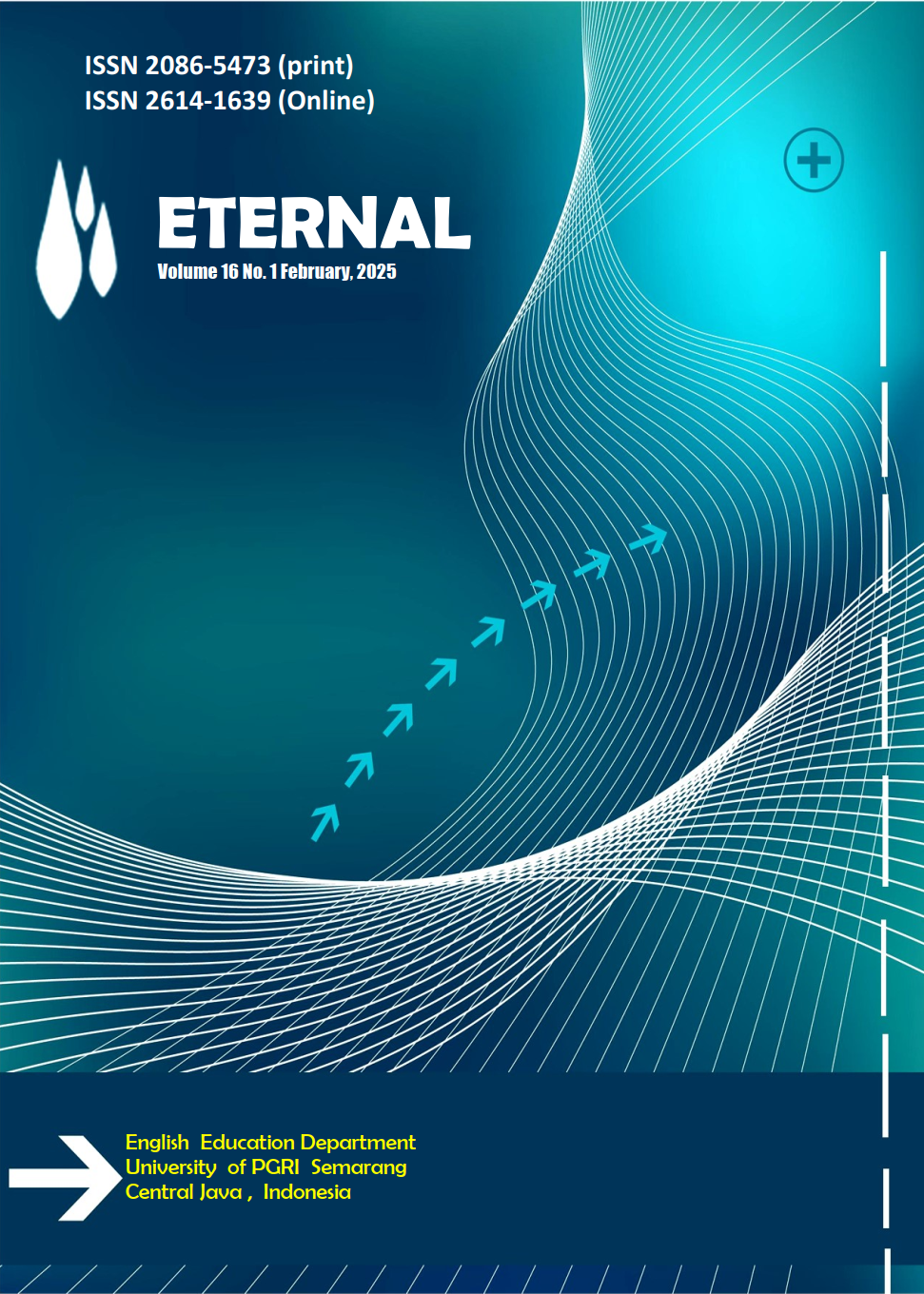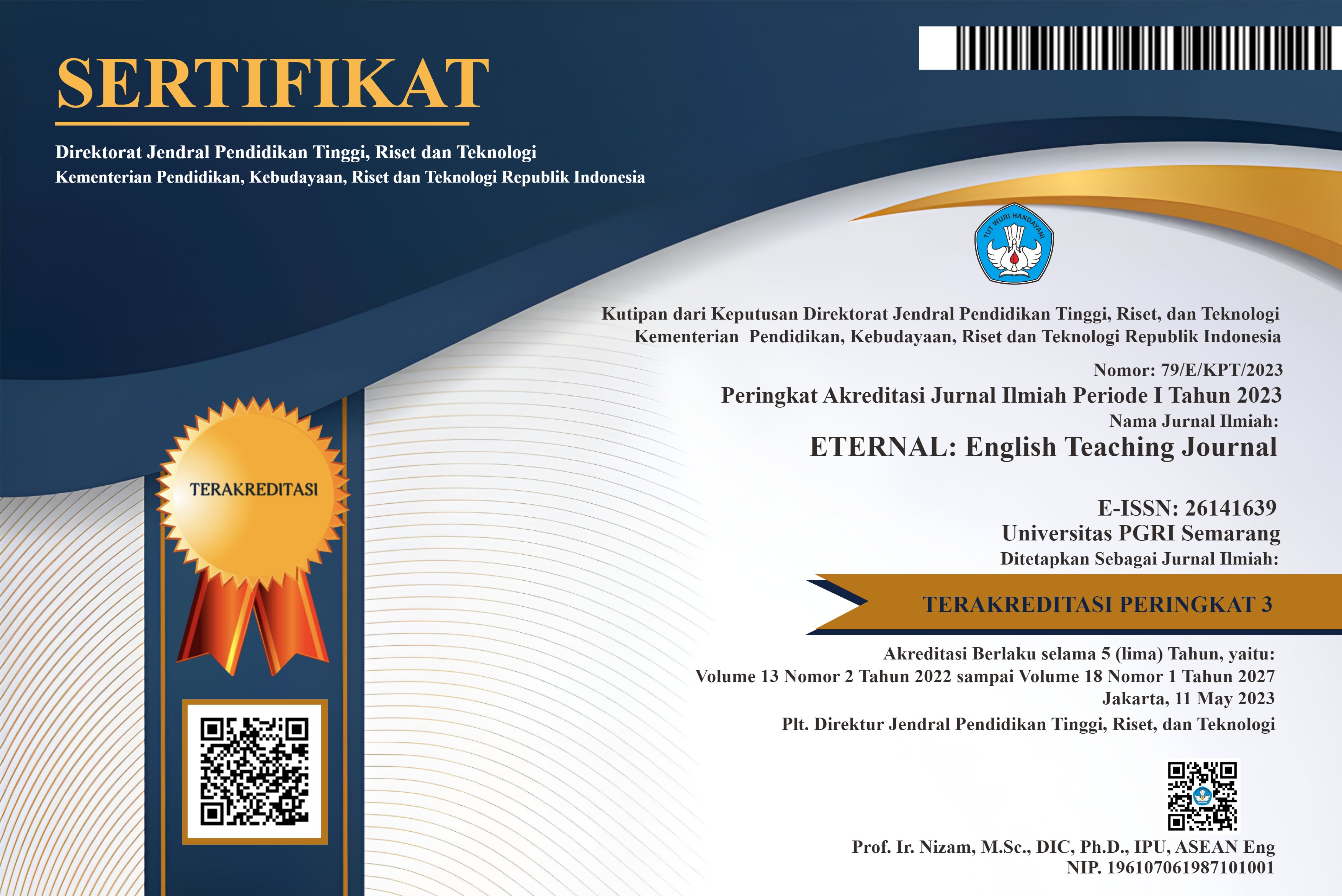An Analysis of Politeness Strategies in English Textbook Dialogues on Faith and Morality
DOI:
https://doi.org/10.26877/eternal.v16i2.1459Keywords:
English Textbook, Faith, Morality, Pancasila Student Profile, Politeness StrategiesAbstract
Faith and morality have been parts of Indonesian society. The values of Pancasila as the national ideology are sufficient to proof that this nation’s relationship with faith and morality has been inseparable. This study aims to analyze one of the dimensions of the Pancasila Student Profile, “faith, devotion to God Almighty, and noble character,” through the application of politeness strategies in textbook dialogues. The method of this study is qualitative content analysis. The data collection technique of this study is documentation. The data are in the form of dialogue texts from two textbooks from the series of “Buku PR Interaktif Bahasa Inggris.” This study implements the politeness strategy by Brown and Levinson (1987) and the Pancasila Student Profile as part of Indonesia’s character education as the frameworks of this study. After collecting and categorizing the data using those two frameworks, the results of this study show two elements of “faith, devotion to God Almighty, and noble character” to be represented through politeness strategies in the dialogue texts in both of the textbooks. These elements are “moral towards humans” and “moral towards nature.” The results suggest textbook authors to include more balanced representation of all elements within “faith, devotion to God Almighty, and noble character” in order to develop students’ character to be well-rounded individuals. These results also suggest teachers to utilize the textbook dialogues through various activities such as roleplay, group reading, and group discussion to help students learn various types of morality in interactive ways.
References
Here's the bibliography with a single line break between each entry:
Akhmadi, A. (2019). Moderasi Beragama dalam Keberagaman Indonesia. Jurnal Diklat Keagamaan, 13(2), 45. Diakses pada 20 Desember 2024, dari Balai Diklat Keagamaan Surabaya. https://bdksurabaya.e-journal.id/bdksurabaya/article/download/82/45
Astrachan, J. H., Binz Astrachan, C., Campopiano, G., & Baù, M. (2020). Values, spirituality and religion: Family business and the roots of sustainable ethical behavior. Journal of Business Ethics, 163, 637-645.
Beyers, J., (2023). A reflection on morality and religion. Verbum et Ecclesia 44(1), a2847. https://doi.org/10.4102/ve.v44i1.2847
Brown, P., & Levinson, S. C. (1987). Politeness: Some universals in language usage. Cambridge University Press.
Culpeper, J. (2011). Politeness and Impoliteness. Sociopragmatics. 5: 391-436. Ed. Bublitz, Wolfram, Andreas H. Jucker and Klaus P. Schneider. Berlin: De Gruyter, 2011.
Daulay, S. H., Azmi, N., & Pratiwi, T. (2022). The importance of expressing politeness: English education student's perspectives. Tarling : Journal of Language Education, 6(1), 49-68. https://doi.org/10.24090/tarling.v6i1.5158
Elsayed, K. G., Lestari, A. A., & Brougham, F. A. (2023). Role of Religion in Shaping Ethical and Moral Values Among the Youths in Athens, Greece. Journal of Sociology, Psychology & Religious Studies, 5(1), 11-20.
Fani, I. C., Fardhani, A. E., & Bilqis, M. (2024). Analyzing the Pancasila Learner Profile Values in the Eighth Grade English Textbook. International Journal of Academic Multidisciplinary Research (IJAMR), 8(8), 23-32.
Fathallah, R., Sidani, Y., & Khalil, S. (2020). How religion shapes family business ethical behaviors: An institutional logics perspective. Journal of Business Ethics, 163, 647-659.
Hsieh, H., & Shannon, S. E. (2005). Three Approaches to Qualitative Content Analysis. Qualitative Health Research, 15(9), 1277-1288. https://doi.org/10.1177/1049732305276687
Hutabarat, E., Herman, H., Silalahi, D. E., & Sihombing, P. S. R. (2020). An Analysis of Ideational Metafunction on News Jakarta Post about Some Good Covid-19 Related News. VELES Voices of English Language Education Society, 4(2), 142–151. https://doi.org/10.29408/veles.v4i2.2526
Joas, H., (2006). Werte und religion in Liz Mohn et. al. (ed.), Werte: Was die Geschelschaft zusammenhält, pp. 19–32, Verlag Bertelmanss Stiftung, Gutersloh.
Juergensmeyer, M., (2005). Religion in global civil society. Oxford University Press, Oxford.
Laksana, B. K., & Wood, B. E. (2019). Navigating religious diversity: Exploring young people’s lived religious citizenship in Indonesia. Journal of Youth Studies, 22(6), 807-823.
Miles, M. B., & Huberman, A. M. (1994). Qualitative data analysis: An expanded sourcebook. SAGE.
Noviana, D., & Atur, S. (2020). The character of respect as viewed from moral development and language politeness in college students. In 3rd international conference on learning innovation and quality education (ICLIQE 2019) (pp. 279-288). Atlantis Press.
Patton, M. Q. (2002). Qualitative Research & Evaluation Methods. SAGE.
Rohullah, R. (2017). Pengaruh Perilaku Bahasa dalam Masyarakat Terhadap Mutu Pendidikan dan Perkembangan Sikap/Karakter pada Anak Usia Dini. The 1st Education and Language International Conference Proceedings Center for International Language Development of Unissula, 692-702. https://doi.org/10.52657/jfk.v4i1.525
Salsabila, S., & Rahayu, D. (2023). Politeness Strategies Used by Teenage Characters in Stranger Things Movie Series: A Pragmatics Study. Proceedings Series on Social Sciences & Humanities, 13, 131–137. https://doi.org/10.30595/pssh.v13i.894
Sari, F. Z., & Ma’rifatulloh, S. (2024). Content analysis of character education in “English for Nusantara” textbook for seventh grade students. Bilingua: Journal of English and Arabic Studies, 1(2), 18-24. https://doi.org/10.33752/bilingua.v1i2.6411
Sugiyono. (2018). Metode Penelitian Kuantitatif, Kualitatif, dan R&D [Quantitative, Qualitative, and R&D Research Methods]. Bandung : Alfabeta, CV.
Suharsiwi, & Sari, N. (2023). Teacher and student book analysis integrated thematic character of Pancasila student profile in grade I SD or MI theme I is myself. Educatum: Jurnal Dunia Pendidikan, 1(1), 39-51. https://doi.org/10.62282/je.v1i1.39-51
Suryantari, H. (2022). Exploring character of Pancasila students in the English textbook for the tenth grade senior high school students. Journal of English Language Learning, 6(2), 229-243. https://doi.org/10.31949/jell.v6i2.3772
Vuong, Q. H., Ho, M. T., Nguyen, H. K. T., Vuong, T. T., Tran, T., Hoang, K. L. & La, V. P. (2020). On how religions could accidentally incite lies and violence: folktales as a cultural transmitter. Palgrave Communications, 6(1), 1-13.
Yule, G. (1996). Pragmatics. New York: Oxford University Press.
Zeitalini, N. (2022, July 5). Nadiem Sebut Pelajar Pancasila Punya 6 Profil, APA Saja? detikedu. https://www.detik.com/edu/edutainment/d-6163067/nadiem-sebut-pelajar-pancasila-punya-6-profil-apa-saja







